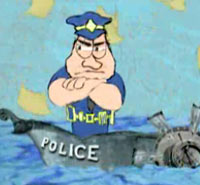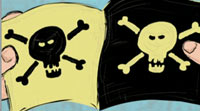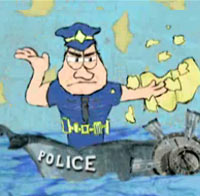
On this page, you'll find regularly updated audio, video, and text reports from our producers and correspondents. We invite you to join the discussion about topics covered here on our board and to subscribe to our audio and video podcasts to download these reports to your computer or MP3 player.

The RNAi "cop" 
The cop's target: viral RNA 
Chop, chop, chop |
8.4.2005 Who Is the Cop?This week Jonah Lehrer and Robert Krulwich have taken up a question many viewers e-mailed in about after watching last week's NOVA scienceNOW broadcast segment on RNAi, namely, "If I've got RNAi 'cops' in my cells, why do I get sick?" Read on... Jonah Lehrer: I've got a question about one of your metaphors from the show. Robert Krulwich: Uh oh. Did a metaphor get me in trouble again? Lehrer: Not exactly. I'm just curious about what's behind the metaphor, what's going on in the actual cell, in real life. Krulwich: Fair enough. Fire away. Lehrer: Well, in the show you had this cartoon... Krulwich: This guy on the left? Lehrer: That's the one. Krulwich: Our version of RNAi. We called him "The Cop." Kind of dashing, no? Lehrer: Yeah, if you go for that kinda thing. Anyway, here's my question. Who is this cop? I'm pretty sure my cells don't really have microscopic policemen looking out for suspicious packages of RNA. Krulwich: This is going to shock you. There is no uniformed cop inside your cells. Lehrer: I'm shocked. Krulwich: What would you say if I told you that the metaphorical cop was actually, in real life, an enzyme? Lehrer: I'd ask you to tell me what an enzyme is. Krulwich: Think of an enzyme as a kind of tool. A screwdriver twists screws, right? Well, an enzyme works on molecules. Each enzyme is designed to do a specific task inside the cell. It sees a screw— Lehrer: You mean a molecule. Krulwich: What? Are metaphors illegal now? Lehrer: Just give it to me straight. Krulwich: Someone's grumpy. Anyway, this enzyme sees the particular molecule it has been designed to work with and goes about and does its job. Think how much more work it would take to screw in a screw if we didn't have screwdrivers. Lehrer: So what kind of enzyme is this cop? In your cartoon, he destroys dangerous recipes that could harm the cell. He literally chops them up. Did you mean that seriously? Krulwich: Yeah, we did. You want unembroidered reality? I'll give you unembroidered reality. What this enzyme actually does is dice up those dangerous messages. Whenever the enzyme sees a suspected virus, it goes to work: chop, chop, chop. Lehrer: What does that mean, "chop, chop, chop"? I still don't quite get it. My cells don't have a collection of stainless steel knives they can whip out whenever they see some double-stranded RNA. Krulwich: Nope, no metaphor there. This enzyme really does chop stuff up. Its scientific name is Dicer. Lehrer: Dicer? Sounds like some new gizmo for the kitchen. Krulwich: I'm not making this up, I swear. This enzyme takes long pieces of RNA and chops—or dices, to be technically correct—that RNA into much shorter pieces. Lehrer: And I assume that by chopping up the virus, Dicer destroys it. Krulwich: Let's just say that being diced up doesn't feel very good. Dicer is violent but very effective. Our cells don't go for this innocent-until-proven-guilty stuff. From their perspective, it's dice first, ask questions later. Lehrer: So this cartoon of yours, it's, well, it's almost true! When you say all plant and animal cells have a defensive system that really goes after dangerous viral messages by chopping them up, you don't mean it "kind of," you mean it literally? Krulwich: In this case—and I am blushing as I say this—the cartoon does not lie. Lehrer: But here's my question: if this anti-viral reaction is so effective, then how come I still get sick? I've got a nasty summer cold right now, which I got from the cold virus. What were my cops doing—[sound of sniffles]—sleeping on the job? Krulwich: Well, no offense, but even though the cops in your cells are very good cops, sometimes the viruses that attack your cells are better. Lehrer: Better? Their team is better than my team? Doesn't seem quite— Krulwich: Humbling, isn't it? But viruses and our cells are engaged in a ceaseless game of hide-and-seek. The good guys prevail for a while, then the bad guys learn new tricks and they prevail. The truth is, over the eons, viruses have always seemed to remain one step ahead of our best defenses. Your sniffle tells the tale. Lehrer: But how do viruses do this? My cellular police sounded pretty invulnerable to me. First they dice, then they follow with their fellow cops, then they destroy. How do viruses survive that? Krulwich: Scientists aren't quite sure, but they've found evidence that some viruses—at least in plants—can literally turn off our cellular police. Lehrer: Turn them off? Krulwich: Yup. Lehrer: You mean my cops, my defenders, have an "OFF" switch? Krulwich: There seems to be a way to switch them off, yes. Lehrer: How? Krulwich: This is brand-new science, so no one really knows. But scientists have found a virus that infects tomato plants that has figured out a way to just switch off the tomato plant's elaborate defenses. It slips our cops a generous bribe, and all that dicing just stops, dead in its tracks. Lehrer: The poor tomato plant. What can it do? Krulwich: Evolve a better defense system. The plant has to figure out a way to keep its cops from taking the viral bribes. Lehrer: So there are no permanent victories here? Krulwich: Nope. This battle between viruses and cells has been going on for hundreds of millions of years. It shows no signs of ending now. Our cells get better at protecting us, but viruses get better at infecting us. It's a pretty pure example of evolution at work.
Lehrer: Great. Pass the Kleenex. |
|||||||||||

Robert Krulwich is host and executive editor of NOVA scienceNOW. Jonah Lehrer is a NOVA scienceNOW online contributing editor. He recently completed a Rhodes scholarship at Oxford University's Wolfson College. |
||||||||||||
|
© | Created August 2005 |
||||||||||||